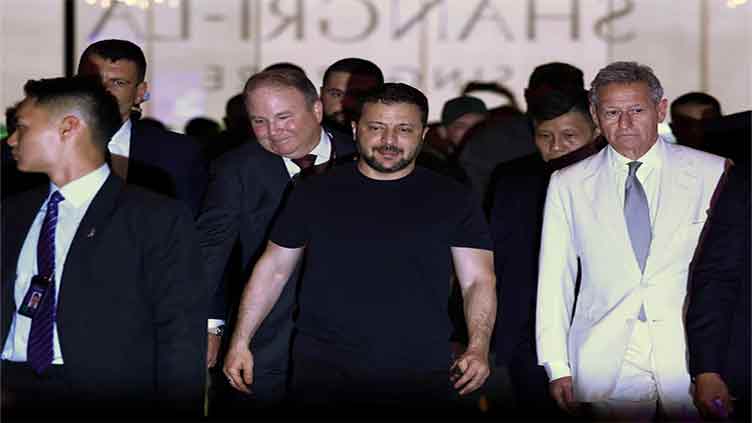US shifts focus to China risks; Zelenskiy arrives at Asia defence meeting

World
US shifts focus to China risks; Zelenskiy arrives at Asia defence meeting
SINGAPORE (Reuters) - US Defense Secretary Lloyd Austin tried to refocus attention on China's threat in the Asia-Pacific on Saturday, seeking to alleviate concerns that conflicts in Ukraine and Gaza have distracted from America's security commitments in the region.
Just hours after Austin spoke at the annual Shangri-La Dialogue, Ukrainian President Volodomyr Zelenskiy arrived in Singapore, where he will address delegates at the security forum on Sunday.
In a statement on the social media platform X, he said that he had come to gather support from the Asia-Pacific region for a peace summit planned for June 15-16 in Switzerland. He said he planned to hold several meetings, including with Singapore’s President Tharman Shanmugaratnam and Prime Minister Lawrence Wong, Timor-Leste President José Ramos-Horta, Austin, and Singaporean investors.
Austin met his Chinese counterpart, Dong Jun, on the sidelines of the conference on Friday in a bid to cool friction over issues ranging from Taiwan to China's military activity in the South China Sea.
There has been increasing concern that Washington's focus on helping Ukraine counter Russia's invasion and support for Israel's war in Gaza, while trying to ensure that the conflict does not spread, has taken away attention from the Indo-Pacific.
"Despite these historic clashes in Europe and the Middle East, the Indo-Pacific has remained our priority theatre of operations," Austin said in his speech, which appeared aimed at underlining the administration's legacy in the region as President Joe Biden's first term in office nears its end.
Biden is running for re-election in November against former President Donald Trump.
"Let me be clear: The United States can be secure only if Asia is secure," Austin said. "That’s why the United States has long maintained our presence in this region."
Austin underscored the importance of alliances in the region.
"And ... peaceful resolution of disputes through dialogue and not coercion or conflict. And certainly not through so-called punishment," Austin said, taking a shot at China.
In response, Chinese Lieutenant General Jing Jianfeng said the US Indo-Pacific strategy was intended "to create division, provoke confrontation and undermine stability".
"It only serves the selfish geopolitical interests of the US and runs counter to the trend of history and the shared aspirations of regional countries for peace, development and win-win cooperation," said Jing, deputy chief of the Joint Staff Department of China's Central Military Commission.
Some US officials say Beijing has become more emboldened in recent years, recently launching what it described as "punishment" drills around Taiwan, sending heavily armed warplanes and staging mock attacks after Lai Ching-te was inaugurated as Taiwan's president.
GAZA PROPOSAL
Indonesia's president-elect, Prabowo Subianto, told the meeting that his nation was willing to send peacekeeping troops to Gaza to maintain a ceasefire, if needed.
He said US President Joe Biden's three-phase proposal for a ceasefire in Gaza was a step in the right direction.


